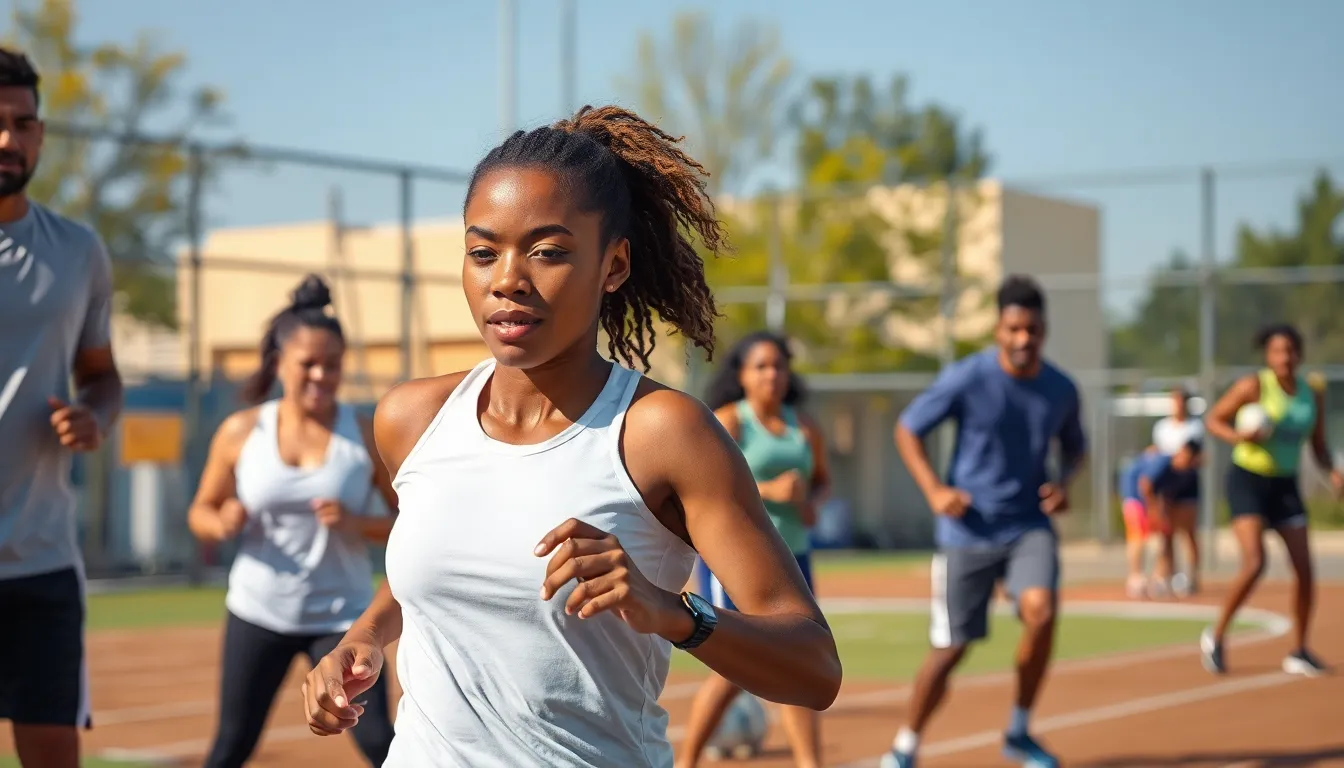Sport science isn’t just for athletes who want to break world records or impress their friends with their bench press. It’s a fascinating field that blends biology, psychology, and biomechanics to unlock the secrets of human performance. Ever wondered why some people can run marathons while others struggle to make it to the fridge? Sport science has the answers—and they’re not just for the gym rats.
What is Sport Science
Sport science examines the biological, psychological, and biomechanical elements that influence human performance in physical activities. Researchers analyze how these factors contribute to athletic success or participation in various sports. It’s a multifaceted discipline benefiting everyone, from elite athletes to recreational participants.
The biological aspect investigates how the body’s systems, such as muscles and energy pathways, respond to exercise. For example, understanding muscle fiber types can inform training regimens that optimize strength or endurance. Psychological factors also play a role, addressing how mental states affect performance. Techniques such as visualization and goal-setting enhance athletes’ focus and motivation.
Biomechanics focuses on movement efficiency and technique. Analyzing biomechanics helps in crafting optimal training programs and reducing the risk of injury. Coaches utilize these insights to refine athletes’ techniques, which enhances their performance and longevity in sports.
Sport science research translates into practical applications for athletes and non-athletes alike. Fitness enthusiasts benefit from tailored exercise programs based on scientific principles. Moreover, sports organizations implement these principles to improve training and recovery strategies, leading to better performance outcomes.
Sport science encompasses various disciplines that work together to provide valuable insights into human physical performance. Gathering and synthesizing this information enables everyone to achieve their personal best, whether in competitive sports or recreational activities.
Key Disciplines in Sport Science

Sport science comprises several key disciplines that deepen understanding of athletic performance and physical activity.
Exercise Physiology
Exercise physiology examines how the body responds to physical activity. It focuses on the complex interactions of systems, such as muscles and cardiovascular functions, during exercise. Researchers study how training affects strength and endurance adaptations. Various techniques assess metabolic rates and energy expenditure, guiding athletes in optimizing performance. This discipline also informs recovery strategies, emphasizing the importance of rest in enhancing overall fitness.
Biomechanics
Biomechanics explores human movement mechanics to improve athletic performance. The discipline utilizes physics principles to analyze how forces affect motion. Researchers assess techniques, such as running form or lifting mechanics, to identify efficient movement patterns. These insights aid in creating training programs tailored to individual athletes, helping reduce injury risks. Enhanced understanding of biomechanics improves performance outcomes in both competitive and recreational settings.
Sport Psychology
Sport psychology addresses the mental aspects influencing athletic performance. It examines how mindset, motivation, and emotions impact competition. Techniques like visualization and concentration training foster mental resilience and focus. Furthermore, researchers develop strategies to combat performance anxiety, enhancing athletes’ confidence. This discipline extends its benefits to all individuals involved in sports, promoting overall well-being and personal growth in physical endeavors.
Applications of Sport Science
Sport science finds its applications across various domains, enhancing athletic performance and promoting health. This section delves into two prominent applications: performance enhancement and injury prevention.
Performance Enhancement
Performance enhancement techniques utilize principles from sport science to improve athletic capabilities. Training regimens are tailored based on exercise physiology insights, optimizing energy usage during physical exertion. Nutrition plays a vital role, where dietary strategies are informed by understanding metabolic processes. Psychological preparation techniques, such as visualization, help athletes mentally rehearse their performances, often resulting in improved focus. Biomechanical assessments identify technique inefficiencies, allowing for specific adjustments that increase performance levels. Data-driven approaches, like wearable technology, monitor real-time metrics to guide athletes in fine-tuning their training.
Injury Prevention
Injury prevention strategies stem from a comprehensive understanding of biomechanics and physiological responses. Analyzing movement patterns helps identify risk factors, leading to the development of personalized training programs. Warm-up routines are designed based on insights into muscle function, enhancing flexibility and strength before physical activity. Strength-training programs target muscular imbalances identified through biomechanical assessments, reducing strain during performances. Recovery protocols are informed by exercise physiology, ensuring that athletes can safely return to training following intense exertion. Regular screenings and assessments provide ongoing evaluations, enabling adjustments to training regimens that further minimize injury risks.
The Importance of Research in Sport Science
Research forms the backbone of sport science, driving advancements in performance and safety. Data collected through empirical studies aids in understanding how physical and mental factors impact athletes. Whenever new information emerges, it informs training methods and recovery strategies tailored to individual needs.
Quantitative studies offer insights into physiological responses to exercise. Researchers measure variables such as heart rate, oxygen consumption, and lactate levels during various activities. These metrics help develop scientific training regimens that enhance endurance and strength.
Qualitative research plays a vital role in understanding psychological aspects. Analysts examine how mental states influence performance outcomes. Techniques such as goal-setting and visualization strategies emerge from these findings, helping athletes maintain focus and motivation under pressure.
Scientific inquiry into biomechanics reveals how movement efficiency can prevent injuries. Investigations into gait patterns and joint mechanics yield strategies to optimize athlete performance. Understanding the mechanics of movements leads to injury reduction and improved training effectiveness.
Interdisciplinary studies combine elements from biology, psychology, and biomechanics. Collaborative research teams often identify novel approaches to enhance athletic capabilities. These collaborations foster innovation, benefiting both elite athletes and recreational participants.
Overall, research enhances the field of sport science. Continuous discovery ensures that the understanding of human performance evolves. As new studies emerge, both athletes and coaches can rely on evidence-based strategies that maximize success and promote health.
Future Trends in Sport Science
Emerging technologies significantly influence the field of sport science. Innovations in wearable devices enable real-time monitoring of physiological metrics. These devices provide athletes and coaches with data on heart rate, movement patterns, and recovery. Researchers also focus on artificial intelligence tools that analyze this data, guiding training decisions based on predictive analytics.
The role of big data is growing, transforming performance analysis. Analytics platforms aggregate data from various sources, allowing for detailed insights into athlete performance trends. Performance optimization through data-driven decisions leads to more personalized training programs. By incorporating machine learning models, sport scientists can identify patterns that human analysts might overlook.
In addition, nutritional science is evolving within sport science. The development of personalized nutrition strategies recognizes that athletes have unique dietary needs. Advanced research on supplements enhances recovery while optimizing performance. Individualized meal plans, based on genetic profiling and activity levels, are becoming more common in elite training environments.
Mental health awareness is gaining traction in sports psychology. Recognition of psychological factors impacts athletic performance and overall well-being. As a result, incorporating mental training techniques is crucial for athletes. Mindfulness practices and cognitive behavioral strategies are increasingly utilized to enhance focus and resilience.
Collaboration between disciplines is essential. Interdisciplinary approaches yield richer knowledge and innovative solutions. This collaboration spans physical therapy, nutrition, and technology, creating comprehensive support systems for athletes. Utilizing multidisciplinary insights leads to a holistic understanding of athletic performance.
Lastly, sustainability is emerging as a vital consideration. Sport science is beginning to address environmental impacts associated with athletic training and events. This includes promoting eco-friendly practices in sports organizations and developing sustainable training facilities. A commitment to sustainability will shape future practices within the field.
Conclusion
Sport science plays a crucial role in enhancing athletic performance and promoting overall well-being. By merging biology, psychology, and biomechanics, it offers valuable insights applicable to athletes and fitness enthusiasts alike. The field’s focus on research and innovation paves the way for tailored training programs that optimize performance and reduce injury risks.
As technology continues to evolve, the integration of wearable devices and data analytics will further refine training strategies. Additionally, the growing awareness of mental health in sports psychology highlights the importance of a holistic approach to performance. Ultimately, sport science not only supports elite athletes but also empowers individuals at every level to achieve their fitness goals and enjoy a healthier lifestyle.



